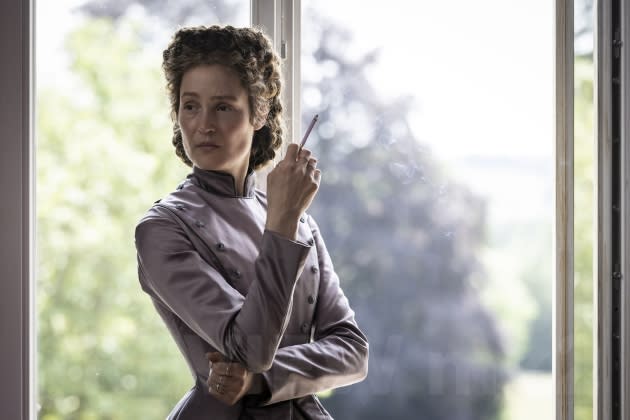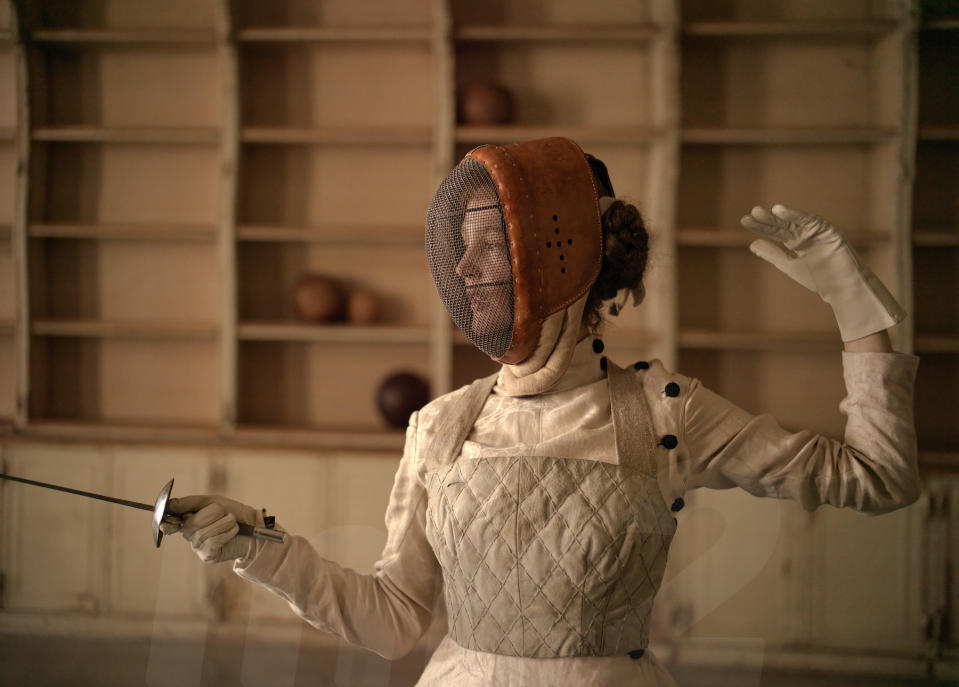‘Corsage’ Is One Big Middle Finger to the Patriarchy
- Oops!Something went wrong.Please try again later.
- Oops!Something went wrong.Please try again later.
- Oops!Something went wrong.Please try again later.
- Oops!Something went wrong.Please try again later.

Empress Elisabeth of Austria (Vicky Krieps), the historical heroine of Marie Kreutzer’s Corsage, does not have it easy. When the movie opens, in 1877, she is on the verge of turning 40 years old and has feelings about it. “At the age of 40, a person begins to disperse and fade,” she says. Only, according to a too-attentive public being egged on by nosy tabloids, Elisabeth is doing the opposite of fading. Her relationship to food is, like her body, subject to public speculation. She wears a corset tightened to within an inch of her life and is on a damningly restrictive diet. She is snared in the problem of image. She orders her portraitist to fall back on previous portraits for details rather than having her finish posing for a new one — it guarantees that she will look young. Not young enough for her husband, Emperor Franz Joseph I (Florian Teichtmeister), to give up courting other, younger women, of course.
Corsage is not a sweeping portrait of this woman, but something tighter and in many ways more focused. It covers only a handful of years. The movie does not extend forward to the tragic death of her son Prince Rudolf (Aaron Friesz) by murder-suicide in 1889, nor to Elisabeth’s own assassination in 1898. This movie is specifically concerned with problems of image and age and the withering pressures on a woman of Elisabeth’s stature as her value — as a mother, as a wife, as an empress — is seemingly receding. This is a woman who smokes, rides horses, cuts her hair, displays some sexual curiosity, embraces new technology (the movie invents an 1878 encounter with the early film innovator Louis Le Prince, declaring her as a woman way ahead of the cultural curve). She seems too smart, too adventurous to be stuck behind the scenes of an image-bound empire.
More from Rolling Stone
U.S. Is Investigating Mysterious Symptoms Experienced by Diplomats in Vienna
While We Celebrate Carl Nassib for Coming Out, We Need to Talk About Feminism
Yet that, as far as Kreutzer’s movie is concerned, is what is demanded of her. It’s why she’s fearful of going a little nuts — because then what will happen to her? “Her soul is like a chaotic museum,” says her close friend and lady-in-waiting Countess Marie Festetics (Katharina Lorenz), meaning that Elisabeth is a bit unpredictable and often hard to read, even when being pleasant. Maybe it’s better to say that Elisabeth is, intellectually, overqualified for the job — while in the same moment, as a woman who’s growing a little older, being more physically underqualified by the day.
The extraordinary thing about Corsage is the chance it offers us to watch Elisabeth navigate her impulses amid the restrictive decorum of her position. This is a high point for Krieps’ performance: she’s an actor who can express her inner frustrations without glowering, who can flit between forms of charisma that are both active and passive. You immediately believe her frustration, and the movie wisely zeroes in on it from the very start, closing in on her face at an event as, all of a sudden, she faints. She isn’t exactly distressed by this, afterward — that’s the somewhat rebellious side of her. She can find amusement in her breaks with protocol. But the protocol persists: she faints, we gather, from the somewhat torturous regimen of dieting and corset-tightening that rules her body. What Corsage leaves appreciably complicated is the question of who, really, is doing the ruling. The movie is attuned enough to gossip that we can understand these gestures as a bit of image management. But we hone in on Elisabeth’s face enough times, as she’s being suited up, to grow curious about the woman who demands that the corset be knotted even tighter.
It’s strange that one poster for the movie shows a gowned Vicky Krieps giving a finger to the camera. Corsage isn’t nearly as insolent as all that. Its approach to Elisabeth’s modernity is a little more delicate. She’s headstrong and occasionally willful, but she isn’t a punk icon — thankfully. That would be too easy. Corsage instead favors an approach that can occasionally feel indecisive. It’s as if the brunt of the movie were of one subtler attitude, and then a handful of bells and whistles at its margins — intrusive modern needle-drops, the occasional winking aside from Elisabeth — were an attempt at something more anachronistic and daring. The result is not so convincing if seen solely as a bit of double consciousness on Elisabeth’s part, with the more staid movie representing her from outside and the edgier sidebars representing her from within: mask on, mask off.
That would make sense though, wouldn’t it? This is a movie about the chokehold of a woman’s public persona, the mores and expectations that descend down on her from outside, a situation entirely divorced from her curiosities, feelings, interests. Corsage is hardly the first piece of art to tackle the gilded cage, but movies about women and empire have always been especially right for this. Our heroine is charged, by her emperor husband, with being a representation. Not a mind (he does not care to hear her opinions on Sarajevo); not even a consistent sex object (he has an 18-year-old plaything for that, at Elisabeth’s eventual encouragement). Her effort to visit hospitalized soldiers wounded at war is fine and well, even encouraged for morale’s sake, but not because Franz cares to hear her opinions on war or politics.

Her visits to women in a psychiatric hospital, meanwhile, aren’t nearly as important to the crown. But they are important to Elisabeth — a vision of her future, maybe, or of the life she’d be living were she not both the Empress of Austria and the Queen of Hungary. These women are nearly tortured during their treatment, and for what? One of them is there because she is promiscuous; the other is there because of depression over the loss of a child. Pointed examples that reflect back directly on our heroine; the movie is nothing if not direct (as a match cut from one of these institutionalized women in a bath to the free, rich Elisabeth in a bath proves).
This Elisabeth masturbates and cozies up to her cold-hearted husband with occasional handjobs. She too has lost a child — a daughter named Sophie. Her husband Franz, with his big imperial beard and its detachable, extravagant sideburns, has already been telling people that she can barely take care of herself, chastising her privately, turning their daughter Valerie against her. She would be one of these imperiled, institutionalized women if not for the crown, no doubt. But because she has the crown, she has access to a cure. A doctor prescribes her heroin. That’ll do it. She likes the drug so much that she gets Marie to start standing in for her at public functions. And even this tells us something about Elisabeth’s situation. Marie goes out for one test drive in disguise and comes back vomiting from the tightness of her corset. It has a way of clarifying how stultifying these restrictions have been for Elisabeth, all along. Fainting spells aside, she’s remarkably been composed, considering.
Corsage is not a great movie, but it’s good at detailing one woman’s circumstances. It doesn’t browbeat us with meaning, which it had every right to do, but instead attempts something humbler. Krieps carries the movie because we believe in her as a woman both of Elisabeth’s own time and place and simultaneously too modern — there’s a freedom behind her eyes that the movie rightly makes a meal of. The future for Elisabeth seems perilous from the outset of this movie, and I don’t mean because of her assassination. She’s already being murdered on a daily basis by her uptight daughter, Valerie, who’s like a walking rulebook, courtesy of her father. Elisabeth daringly reclines in bed with a wounded soldier, during a visit to a hospital, to offer him the pleasure of a cigarette and good conversation — relatability of the likes that our own hyper-staged era has not seen. And yet her daughter’s response is shame: “Smoking is unfitting. You embarrassed me.” This is the Corsage that works: the one that shows that the call is coming from inside the house. The movie builds toward a disappointing finale of vague empowerment imagery featuring Elisabeth and other women in her life. It needn’t have gone this route to prove its point. The truth of Elisabeth’s situation, her singularity in history, the forces working against her — it’s all already there in her daughter’s eyes.
Best of Rolling Stone

